When it comes to keeping your Dachshund healthy and happy, choosing the right dog food is essential.
Their unique body shape and metabolism make it important to select a diet that suits their needs perfectly. In this post, I will guide you through 15 Easy Tips To Choose the Right Dog Food for Your Dachshund . These key considerations will help you make the best choice for your little companion.
🐕 1. Understand Your Dachshund’s Nutritional Needs
Protein: The Building Block
Fat for Energy
Dachshunds are energetic little dogs, and their nutritional needs differ from other breeds.
Protein is essential for building muscles and maintaining body tissues. Look for dog food that lists meat as the primary ingredient, whether it’s chicken, beef, or lamb.
Fat provides much-needed energy for your active Dachshund. Ensure the food you choose has healthy fat sources like omega-3 fatty acids, which support coat health and brain function.

🍖 2. Choose High-Quality Ingredients
The Importance of Meat as the First Ingredient
Avoid Fillers and Artificial Additives
The first ingredient in your dog’s food should always be real meat.
Meat provides high-quality protein and essential nutrients. Avoid foods that list corn, soy, or wheat as the primary ingredients, as these are fillers with little nutritional value for your dog.
Many commercial dog foods contain artificial colors, flavors, and preservatives, which are unnecessary and could cause allergies or digestive issues. Opt for natural and minimally processed options.
| High-Quality Ingredients | Low-Quality Ingredients |
|---|---|
| Chicken, beef, lamb | Corn, soy, wheat |
| Sweet potatoes, peas | Artificial preservatives |
| Omega-3 rich fish oil | Synthetic colors |

🦴 3. Consider Your Dachshund’s Age and Activity Level
Puppy, Adult, or Senior Dog?
Adjusting Food to Match Energy Levels
Your Dachshund’s age plays a big role in selecting the right food.
Puppies need more calories and protein to support their growth, while adult Dachshunds require a well-balanced diet that maintains their weight. For senior Dachshunds, you might need food with fewer calories and ingredients that promote joint health.
If your Dachshund is more active, like those who enjoy daily walks or playing in the yard, they’ll need a higher-calorie diet to fuel their energy.
| Life Stage | Nutritional Focus | Caloric Needs |
|---|---|---|
| Puppy | High protein, high fat for growth | Higher calorie intake |
| Adult | Balanced protein, moderate fat | Maintain steady calories |
| Senior | Joint support, lower calories | Reduced caloric intake |
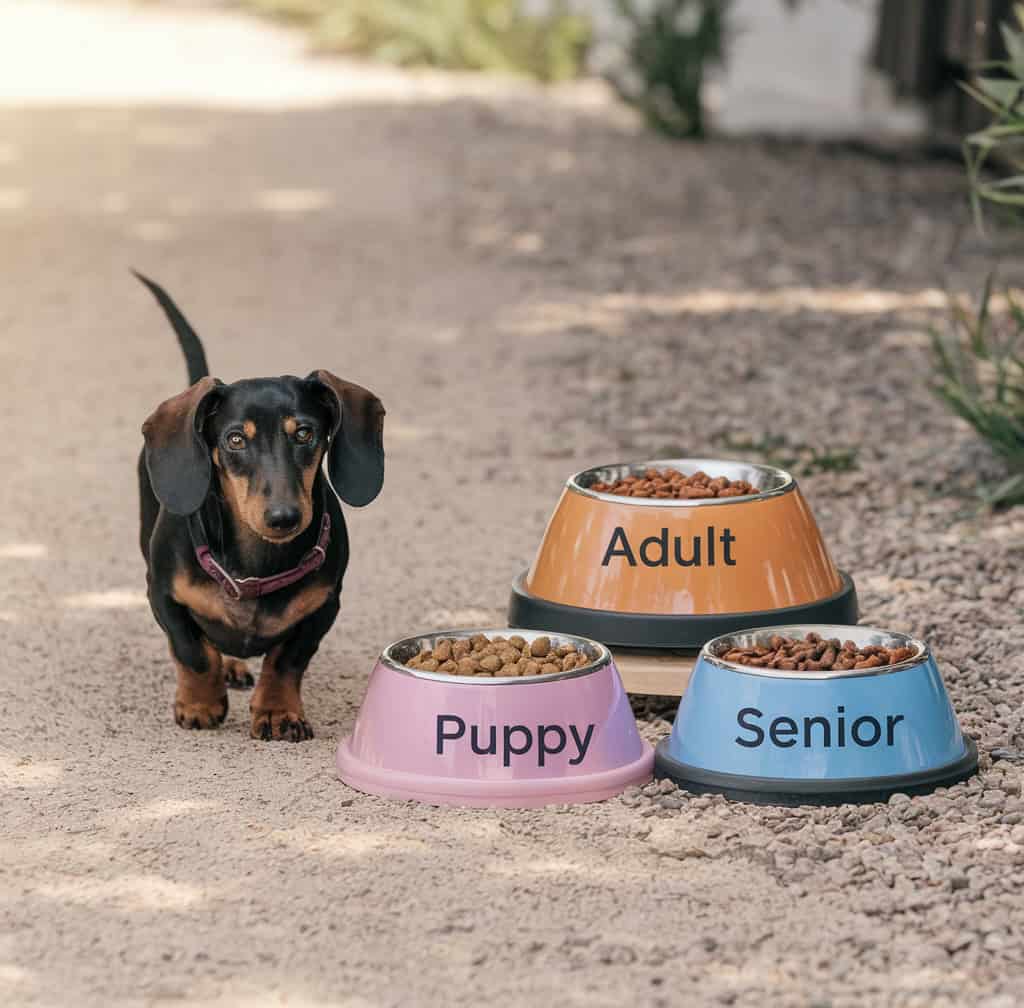
🍗 4. Wet vs. Dry Dog Food
The Benefits of Dry Kibble
When Wet Food is the Better Option
Dry food, or kibble, is the most common option for Dachshunds.
It’s affordable, convenient to store, and helps maintain dental health by reducing tartar buildup. However, wet food might be a better option if your dog is picky or struggles with hydration. Wet food is often more palatable and contains higher moisture content, making it ideal for dogs that need to drink more water.


🧪 5. Pay Attention to Portion Control
Preventing Obesity in Dachshunds
Following Feeding Guidelines
One of the biggest health concerns for Dachshunds is obesity.
Because of their short legs and long bodies, extra weight puts a lot of strain on their spine, which can lead to back problems. Be sure to follow the feeding guidelines on the food label and measure your dog’s portions carefully to avoid overfeeding.
Use this comparison chart to help determine the right portion for your Dachshund:
| Dog Size | Dry Kibble (cups/day) | Wet Food (cans/day) |
|---|---|---|
| Small (10 lbs) | 1/2 to 1 cup | 1/2 can |
| Medium (15 lbs) | 1 to 1.5 cups | 1 can |
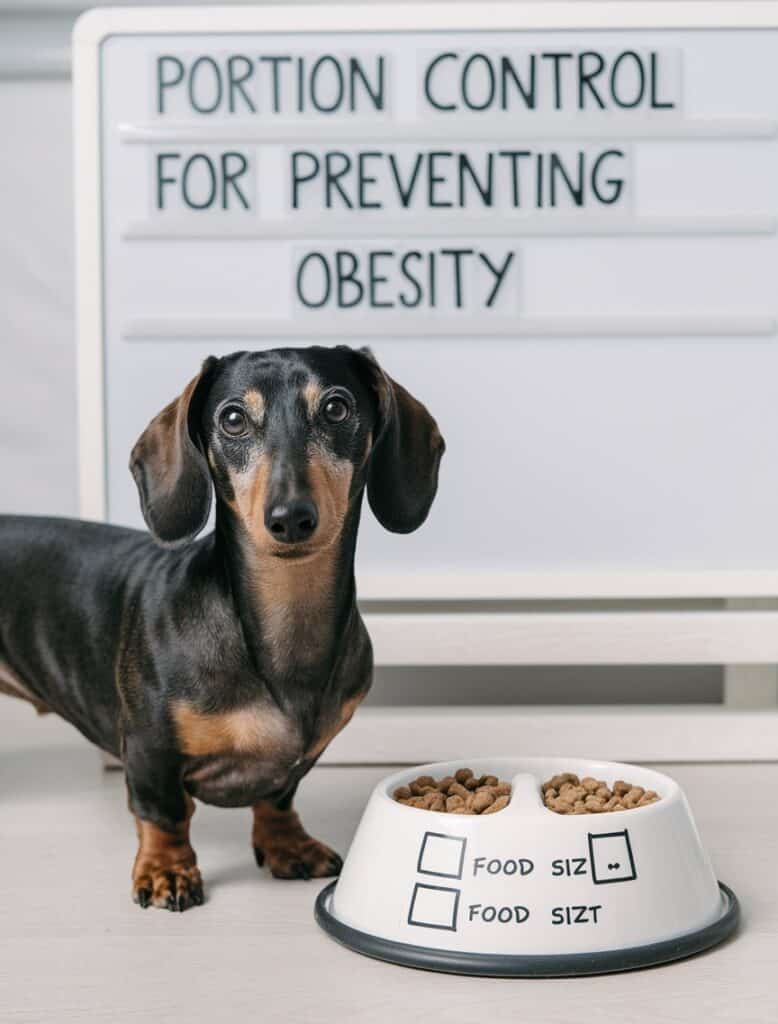

🧡 6. Read the Ingredients List
Understanding What’s in Your Dog’s Food
Look for Specific Meat Sources
The ingredients list is key to knowing if your dog’s food is nutritionally sound.
Look for foods that specify the meat source, like “chicken” or “beef,” instead of vague terms like “meat meal.” Avoid foods with too many fillers, like corn or soy, and ensure that it contains essential nutrients like calcium and phosphorus for bone health.
| High-Quality Ingredients | Low-Quality Ingredients |
|---|---|
| Chicken, beef, or lamb as the first ingredient | Meat by-products or “meat meal” |
| Whole grains like brown rice or oats | Corn, soy, or wheat |
| Omega-3 fatty acids from fish oils | Artificial flavors and colors |
| Fruits and vegetables (carrots, peas, blueberries) | Chemical preservatives like BHA/BHT |
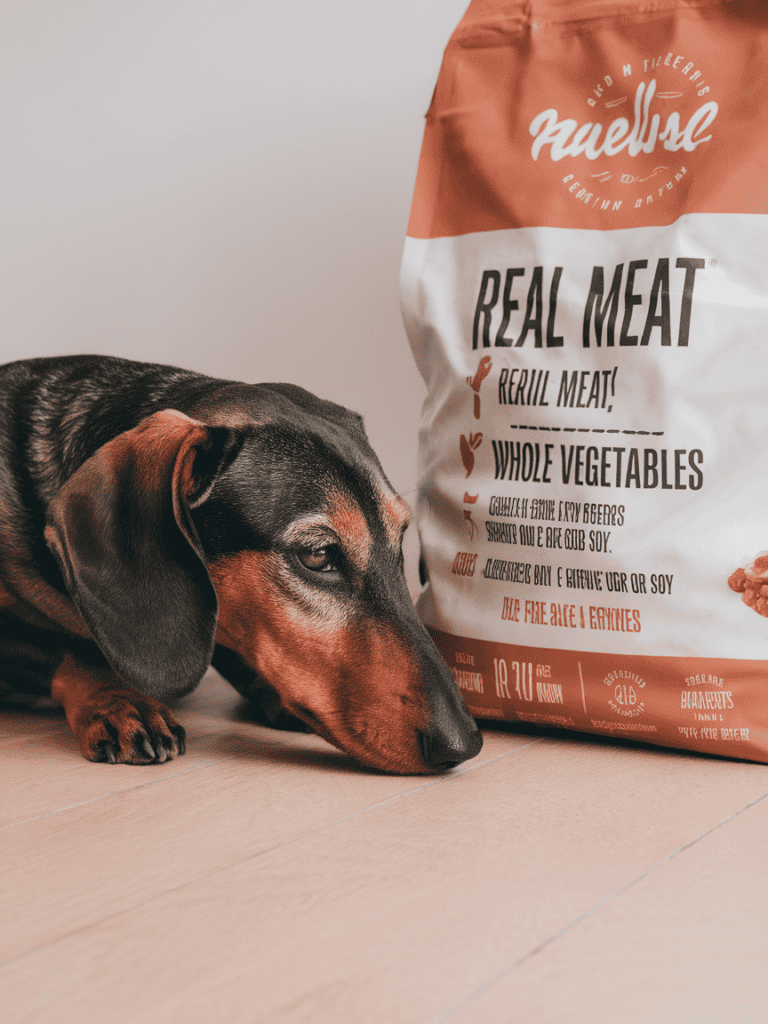

🥕 7. Include Vegetables and Fruits for Added Nutrients
Why Veggies are Important
Safe Fruits for Dachshunds
Including vegetables and fruits in your Dachshund’s diet is a great way to provide added vitamins and minerals.
Carrots, sweet potatoes, and green beans are excellent choices. Fruits like apples (without seeds) and blueberries can be healthy treats that are low in calories but packed with nutrients.
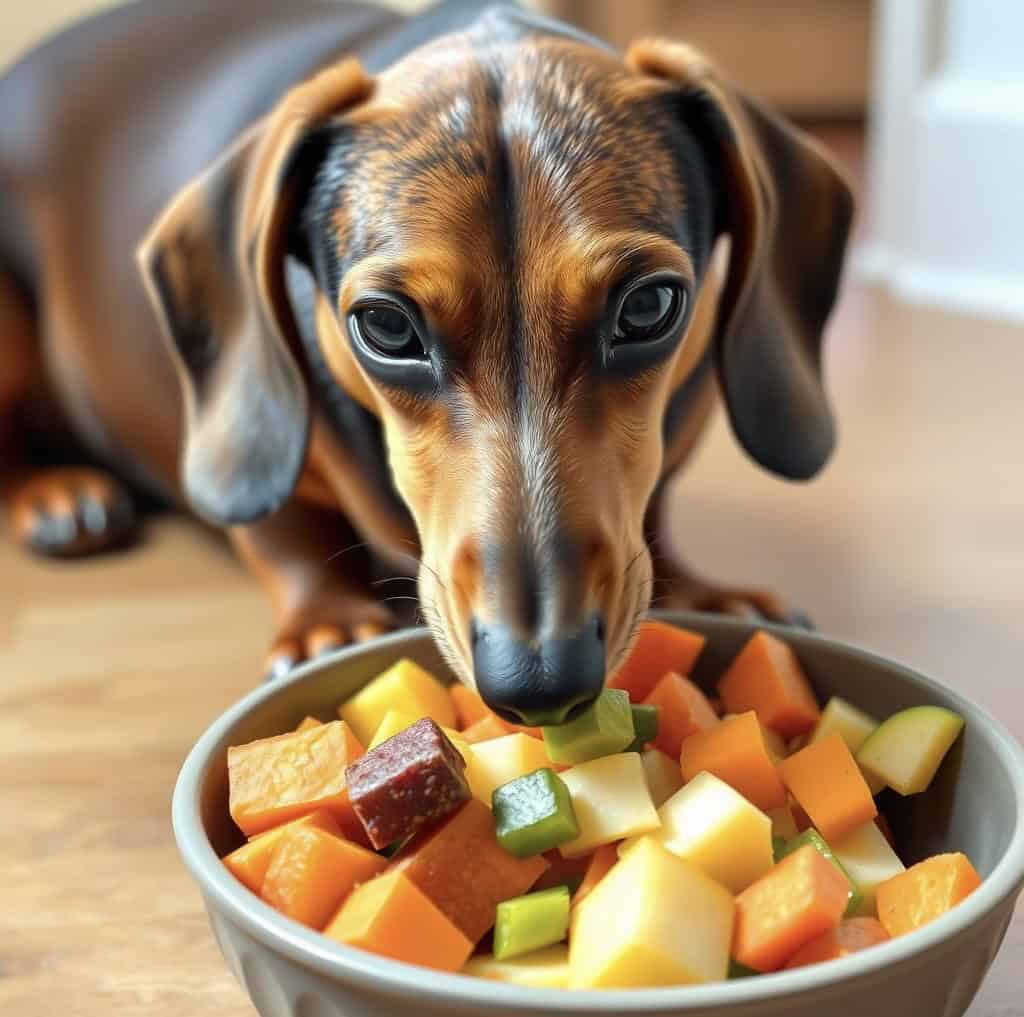

🐶 8. Grain-Free or Not?
The Grain-Free Debate
Is it Right for Your Dachshund?
The grain-free trend in dog food is a hot topic.
Grain-free diets are designed for dogs with grain allergies, but not all Dachshunds require this. However, if your dog shows signs of grain sensitivity, such as itchy skin or digestive issues, a grain-free diet may be beneficial. Consult with your vet to make the best decision.

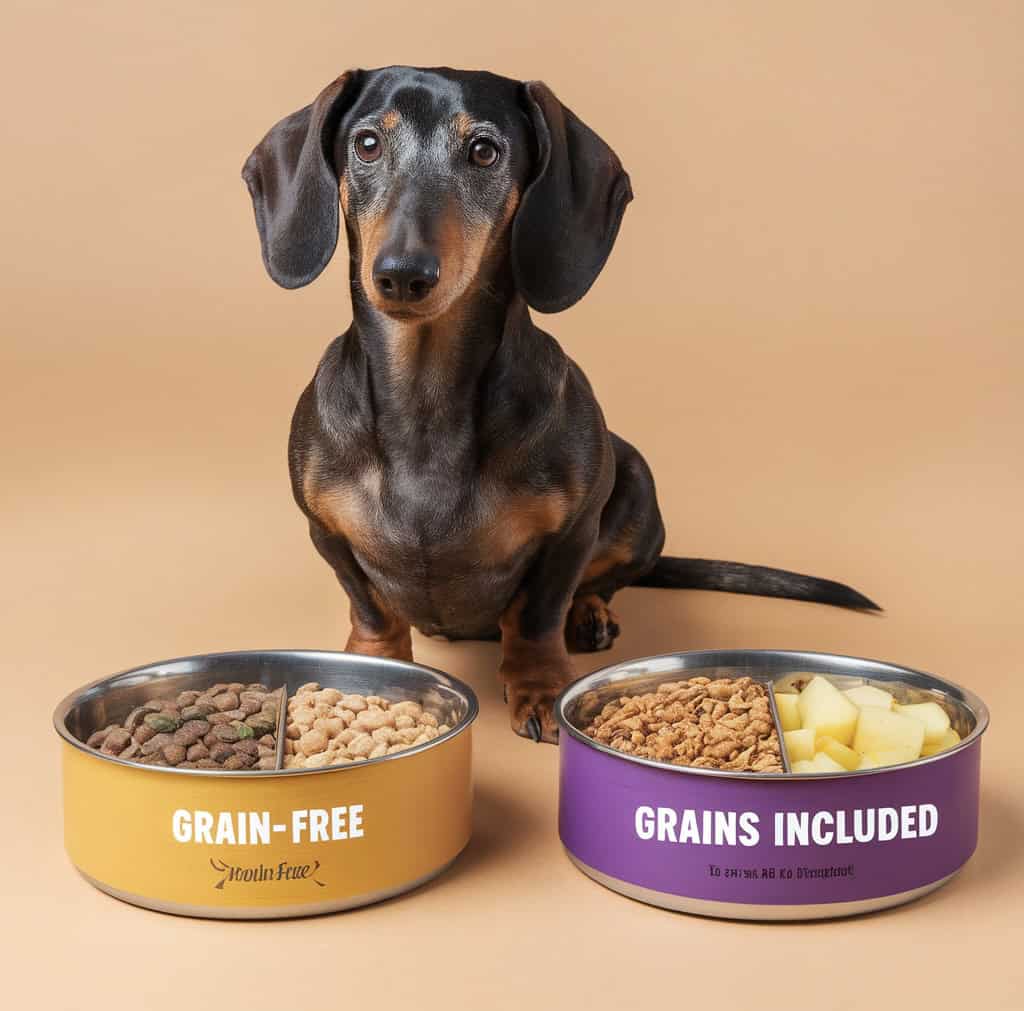

🥩 9. Select Dog Food with Joint Health Supplements
Importance of Joint Health in Dachshunds
Glucosamine and Chondroitin
Dachshunds are prone to joint and back issues because of their long bodies.
Look for dog foods that include glucosamine and chondroitin, as these supplements support joint health and can reduce the risk of arthritis as your dog ages.

🌾 10. Avoid Foods with Common Allergens
Identifying Common Allergens in Dog Food
Signs Your Dog May Have an Allergy
Some Dachshunds can develop food allergies.
Common allergens include chicken, beef, dairy, and soy. If your dog shows signs of skin irritation, excessive licking, or digestive problems, it’s worth switching to a limited ingredient diet.

🍽️ 11. Monitor for Food Sensitivities
How to Identify Sensitivities Early
Adjusting Diet to Improve Health
If your Dachshund starts to develop symptoms of food sensitivity, such as diarrhea, vomiting, or itching, it’s important to evaluate their diet.
Consider switching to a formula that is specifically designed for sensitive stomachs or a diet with limited ingredients to pinpoint the issue.


🏅 12. Consider the Cost vs. Quality Balance
Premium Dog Foods and Their Benefits
Affordable Options Without Compromising Quality
It’s easy to think that higher-priced foods are always better, but that’s not always the case.
While premium dog foods often contain higher-quality ingredients, there are affordable options that still provide balanced nutrition for your Dachshund. Focus on the ingredients list and nutritional content rather than the price tag.


🥩 13. Consider Feeding Raw or Home-Cooked Meals
Benefits of a Raw Diet
Pros and Cons of Home-Cooked Meals
Some owners choose to feed their Dachshunds raw or home-cooked meals.
Raw diets can provide fresh, unprocessed nutrients, while home-cooked meals allow for total control over ingredients. However, these options require more time and nutritional balancing to ensure your dog gets everything they need.
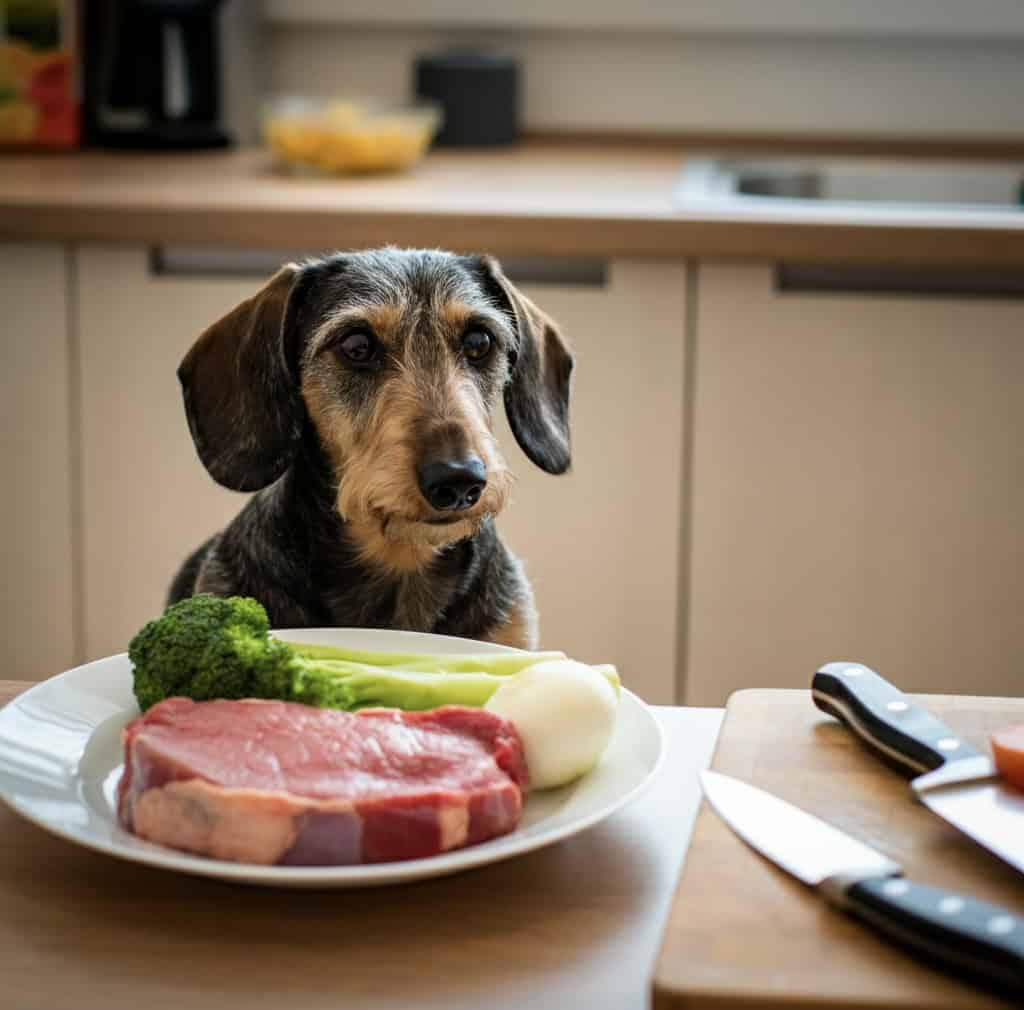
🐾 14. Consult Your Vet Regularly
Importance of Regular Vet Checkups
Adjusting Diet Based on Health Conditions
Your vet is the best resource when it comes to your Dachshund’s nutrition.
They can help you choose a diet that’s right for your dog’s specific needs, whether it’s for weight management, allergies, or other health concerns. Regular checkups ensure that your Dachshund’s diet is keeping them in optimal health.


🍴 15. Transitioning to New Food Gradually
Avoiding Digestive Upset
How to Properly Transition
Whenever you switch your Dachshund’s food, do it gradually.
Start by mixing a small amount of the new food with their old food, increasing the amount of new food over 7-10 days. This method helps prevent digestive upset and gives your dog time to adjust.
🏁 Conclusion: 15 Easy Tips To Choose the Right Dog Food for Your Dachshund
Final Tips for a Healthy Diet
Importance of Monitoring and Adjusting
Choosing the right food for your Dachshund is one of the best ways to keep
them healthy and happy.
By focusing on high-quality ingredients, paying attention to their specific needs, and consulting with your vet, you can ensure they live a long, vibrant life.
Related Links
- American Kennel Club (AKC) – Dog Nutrition
Provides comprehensive information about dog nutrition, covering everything from essential nutrients to food types and feeding guidelines.
AKC Dog Nutrition Guide
